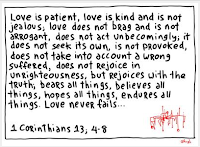 |
| Viktor Frankl (1905-1997) |
"Love," he notes, "is the only way to grasp another human being in the innermost core of his personality. No one can become fully aware of the very essence of another human being unless he loves him. By his love he is enabled to see the essential traits and features in the beloved person; and even more, he sees that which is potential in him, which is not yet actualized but yet ought to be actualized. Further more, by his love, the loving person enables the beloved person to actualize these potentialities. By making him aware of what he can be and of what he should become, he makes these potentialities come true."Frankl's thoughts on love speak, I believe, to all the differing levels of love that the Greeks spoke of; yet, there is perhaps still another level of love which can perhaps encompass all of these varyuing degrees of love, and in so doing actualize the potential in all of us,
"God is love, and he who abides in love abides in God, and God abides in him," we read in the New Testament (1 John 4:16). This level of love, according to Pope Benedict XVI "express(es) with remarkable clarity the heart of the Christian faith: the Christian image of God and the resulting image of mankind and its destiny." But what kind of love is it that is synonymous with God, and which we are told we are capable of manifesting and abiding in?
One often hears or reads of "unconditional love," but is it really possible to have a love without conditions? Perhaps not, so long as that love is focused upon another person, whether it be agape, filial or erotic love. But perhaps it is possible to manifest a love without conditions, if and only if, it is a love that stems from a higher, expanded level of consciousness in which there is no specific object of that love, but rather everything, including the seer, becomes the object of such undifferentiated love.
It is this level of love - manifested in what I have come to think of as a state of "acceptive consciousness" that transcends the ordinary conceptive and rational nature of the self-consciousness of the observer - which seems to be the essence of many of the reported instances of higher religious or mystic experience, experiences reported not only by Christian mystics, but by mystics and sages from all the world's great religious and wisdom traditions.
"Individual selfhood is expressed in the self's capacity for self-transcendence and not in its rational capacity for conceptual and analytic procedures, remarked Reinhold Niebuhr, one of the great theologians of the 20th-century." "Love has taken away my practices and filled me with poetry," writes Rumi, the great 12th-century Sufi teacher and poet.
Unadulterated love, compassion and charity have all been the focus of the world's greatest and most enduring traditions, Christian and Muslim, Jewish and Buddhist, Taoist and Zoroastrian, and so many other traditions alike. But perhaps the greatest statement of this state of "acceptive consciousness," where all pre-conditions and objects of love fall away, is the following famous passage from St. Paul's first letter to the fledgling Corinthian church:
"If I speak in the tongues of men or of angels, but do not have love, I am only a resounding gong or a clanging cymbal. If I have the gift of prophecy and can fathom all mysteries and all knowledge, and if I have a faith that can move mountains, but do not have love, I am nothing. If I give all I possess to the poor and give over my body to hardship that I may boast, but do not have love, I gain nothing.
Love is patient, love is kind. It does not envy, it does not boast, it is not proud. It does not dishonor others, it is not self-seeking, it is not easily angered, it keeps no record of wrongs. Love does not delight in evil but rejoices with the truth. It always protects, always trusts, always hopes, always perseveres. Love never fails.
But where there are prophecies, they will cease; where there are tongues, they will be stilled; where there is knowledge, it will pass away. For we know in part and we prophesy in part, but when completeness comes, what is in part disappears.
When I was a child, I talked like a child, I thought like a child, I reasoned like a child. When I became a man, I put the ways of childhood behind me. For now we see only a reflection as in a mirror; then we shall see face to face. Now I know in part; then I shall know fully, even as I am fully known."When Paul speaks of "the completeness coming,"and when Rumi speaks of "poetry,"this I believe is the love that transcends the individual self, the "acceptive love" that is the height of the religious or spiritual experience of the world's great mystics, irrespective of caste or creed. This is what is meant, I believe, when a wisdom traditions tells us that "God is love;" an objectless love that transcends the limitations of self-conscious thinking. It is the radical, non-dual love of enlightenment.
And now these three remain: faith, hope and love. But the greatest of these is love."
[I Corinthians 13:1-13]

Thanks for sharing this quality information with us. I really enjoyed reading. Will surely going to share this URL with my friends.
ReplyDeletenon dual teachers
Thank for information this free articles post we provides compare and save money to select the top 3 website visit now # Cheapestpackers.co.in
ReplyDeletemovers and packers noida # movers and packers delhi # movers and packers guwahati # movers and packers faridabad # movers and packers ghaziabad # hello